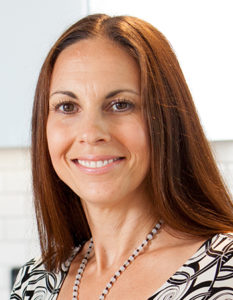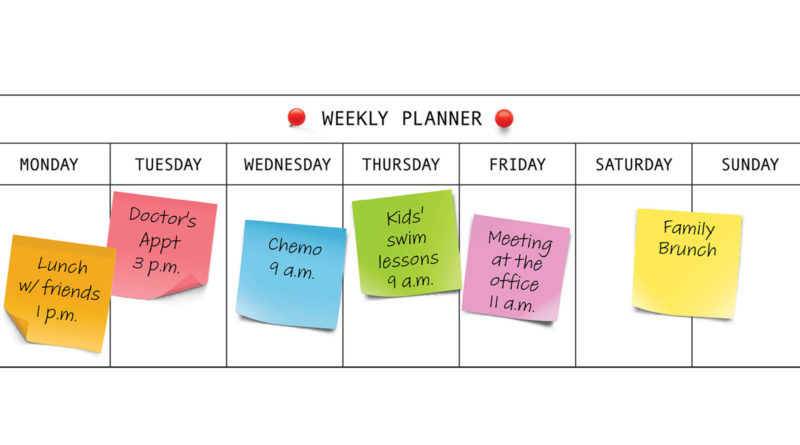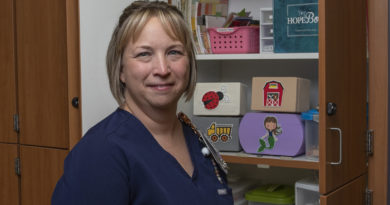Surviving and Thriving
Tips to balance work, family during cancer treatment and through recovery
 Editor’s Note: This is the third column in a series about Carey Stites’ battle with breast cancer.
Editor’s Note: This is the third column in a series about Carey Stites’ battle with breast cancer.
By CAREY STITES
According to an article I came across recently, about 40% of the 14.5 million cancer survivors in the United States are of working age. In addition to the devastating diagnosis of cancer, this statistic speaks volumes to not only the medical challenges cancer patients face but the financial aspects as well.
Many cancer survivors must keep their jobs through treatment and recovery because they exhaust paid time off and cannot afford to work without pay. Furthermore, many must keep working as their health insurance is employer provided with certain contractual obligations tied into coverage.
Finances aside, cancer patients can choose to continue working during treatment and recovery if possible. While everyone’s diagnosis and experience is unique, many cancer patients believe work can keep their mind off the situation and promote a sense of normalcy despite enduring quite the opposite. Going to work or working remotely can help attain a sense of purpose and maintain a sense of control in one aspect of life as quite honestly, the cancer treatment process can make you feel extremely out of control. Staying connected to who you were before cancer as well as having a built-in support system of co-workers can ease the process.
Ultimately, although improvements in cancer treatments and survival have made it possible for more patients to continue working, not everyone wants to. The decision to work or take time off is 100% personal and influenced by the diagnosis, treatment plan and by the type of work. Not everyone can work through treatment, however, the decision should be based upon what is important to you and what you know you can and cannot handle. No two people are alike.
For me, work was as important as treatment and is as important as recovery. I consider myself a work-life balance “expert” and know when to draw the line among work, family and health. Working during my treatment was important for me and kept me focused on something other than cancer. Not only did working help contribute to my medical bills, helping transplant patients at the clinic (especially with nausea) and mentoring college students in my nutrition classes redirected the focus from my illness to my commitment to helping others.
Organization is Key
A cancer diagnosis and treatment can throw a routine overboard — there are doctors’ appointments, treatments, lab draws, tests, surgeries and side effects whether you are undergoing chemotherapy, radiation or both. Without organization, you may unintentionally forget appointments or other important activities such as your kid’s games, dinner plans with friends or work obligations. My advice: get organized and stay organized! I took my extra-large day planner with me just about everywhere I went and put appointments on my calendar as soon as they were scheduled and made detailed notes as needed. This way I knew exactly when my appointments were and scheduled chemotherapy as best I could to coincide with my kid’s obligations.
There is a benefit to having everything laid out in front of you to plan more effectively. When I went into work, I made sure I brought my calendar out and updated our digital work calendar to ensure everyone was on the same page and knew when I was having treatment, attending appointments or had obligations that prevented me from coming into the office.
Use Your Village
Let your colleagues support you; allow them to help if there is something you genuinely need help with. Having my co-workers see the patients or attend important meetings was key in my ability to continue working through cancer, even when I was not feeling up to it or had to run out to another doctor’s appointment.
Be realistic about the workload and only agree to take on projects or appointments if you have the time and energy. Subconsciously it may be easy to believe you are improving yourself and your career by taking on every project which comes your way, but if you end up overwhelmed and sick, with increased stress and decreased productivity, no one benefits. I had to make peace with the fact I could not make it into the office every day and I was not letting anyone down if I was feeling tired, nauseated or sick. This leads in to my next tip.
Take Advantage of Technology
Exploring options such as working from home while going through cancer treatments can keep you engaged at work while taking care of yourself. While not every job qualifies for a remote option, you may be surprised with the opportunities by simply discussing this with your supervisor.
While most of my job in the clinic revolved around direct patient care, I was able to help with other projects and attend meetings virtually on the days I did not feel well enough to come into clinic; thankfully I was also able to continue instructing online nutrition courses as this option provided an amazing amount of flexibility. Working from home is an option worth looking into, especially with today’s technology.
Keep in mind, people with cancer can be protected by federal laws such as the Rehabilitation Act and the Americans with Disabilities Act. A qualified employee with a medical disability is entitled to reasonable accommodations which can include a modified work schedule, reassignment or restructuring of a position. A great resource to help navigate both these acts is the Job Accommodation Network at https://askjan.org or by calling 1-800-526-7234.
Light at the End of the Tunnel
Finding out you have cancer is difficult and devastating; some days it seems the twists and turns with treatment leave you feeling anxious and overwhelmed with thoughts of “How am I going to do this?” I am here to let you know YOU CAN! Whatever your path may be after diagnosis, you are stronger than you think you are — trust me, I know!
Carey Stites, MS, RD, LD, CPT, is a registered and licensed dietitian in Harker Heights. She obtained a master’s degree in nutrition and dietetics from Texas Tech University has been a practicing dietitian since 2001. Carey is also an AFAA certified group fitness instructor and personal trainer; she has promoted health and wellness through presentations, classes, writing and cooking demonstrations all over Texas.




